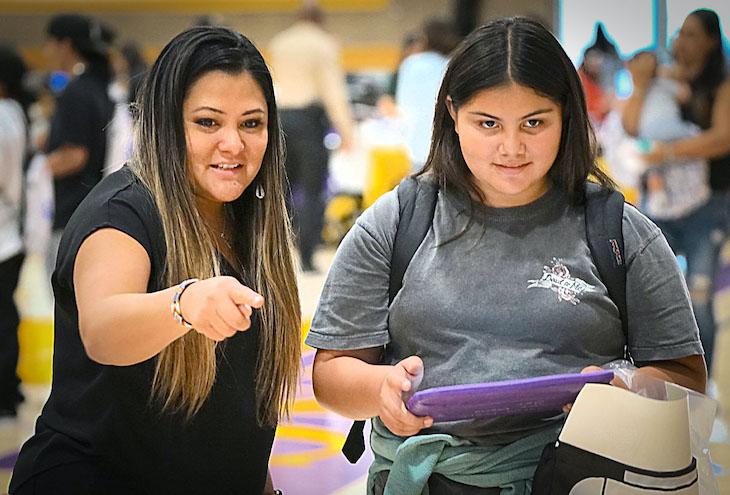Having a mentor can be an integral component to an individual’s professional success. A mentor can help professionals learn and grow, expand their network, and even provide new employment opportunities. It is important to remember that not every style or approach to mentoring is appropriate for every professional. Here are a few ways to mentor a young Native professional.
Learn About Who They Are
Whether or not you are a Native professional yourself, it is your job as the mentor to learn about your unique mentee. Perhaps they have past experiences that have greatly shaped who they are today, what they believe, and how they act. Many Native professionals want their professional work to help them give back to their communities. Never assume that you know what they have been through or how they view their culture and heritage in relation to their professional careers. Instead, ask them questions about themselves and listen carefully to what they tell you.
Highlight Representation
Many Native professionals are one of the few — or only — Natives in their departments or companies. This can leave them feeling discouraged or disconnected. Highlight Native representation for them. It may be in their organization, in their career field, or even in their community. Doing so will not only provide opportunities for them to connect with other Native professionals, but it also will allow them to see that they are not alone.
Encourage Participation
Some young professionals become so focused on their work that they forget to look at the bigger picture. Employee Resource Groups (ERG) allow employees to gather together to discuss topics and concerns regarding specific areas of interest. Encourage your mentee to determine if their company has such a group — particularly one for Native professionals or Asian Americans and/or American Indian and Alaskan Natives. If the company doesn’t have one, perhaps your mentee could look into starting one.
ERGs are wonderful outlets for professionals to connect across organizations and to feel seen and heard in ways that they may not in their everyday work. Individuals feel a greater sense of belonging when they connect with others with similar backgrounds, interests, and goals.
Provide Multiple Ways to Connect
In today’s world, many employees are remote or hybrid. This includes Native professionals. Help them to feel connected to you by offering them a number of ways to stay in touch. It may be phone, email, WebEx, or some other platform. Knowing that there are multiple ways they can get in touch with you will help your mentee to see that you are committed to supporting them. For Native professionals who are not well-represented in the workforce, knowing that they can rely on their mentor and can connect with them as needed can help them continue to pursue their professional goals.
Be an Ally
While this may seem obvious, being an ally is an incredibly important way to help mentor young Native professionals. Show your mentee that you appreciate their culture — don’t appropriate it. Be mindful of your language and avoid phrases or language that is offensive. But don’t stop there. Be an advocate for Native voices in your own organization and community. Young Native professionals, like many minorities, are subject to inappropriate comments and a lack of cultural understanding that goes beyond the workplace. Serving as an advocate will not only help your mentee to see how much you value them, but it also will help to create a safe space where your mentee can learn and grow.
You can also help them understand what they can do if they ever find themselves in a situation where they feel disrespected. Help them think about how they can react in a way that educates others, instead of alienating them. Identify individuals in the organization that they can turn to when they need support. If necessary, help them find another organization that better supports and appreciates their Native heritage.
Being a mentor is an important role, and shouldn’t be taken lightly. While each mentor/mentee relationship is different, it is important to understand that there may be additional ideas to keep in mind when it comes to mentoring young Native professionals. Listen to them, get to know who they are, and help them find others like themselves so that they can thrive in the workplace and beyond. Happy mentoring.
 On Topic
On Topic
Matt Echohawk-Hayashi, Leadership and Change Consultant, Headwater People
What are the benefits of mentoring for young Native professionals?
Mentorship is so valuable for so many reasons and every mentoring relationship is unique to the people involved. However, for me, the best mentors are providing three essential services to young Native professionals: relevant insight, connecting new opportunities, and belief.
Relevant Insight
Our individual journeys fill our perspective from the victories, failures, and meaningful experiences we’ve walked through in our professional and personal lives. The treasure trove of these lessons can become quite vast if our journey is long enough. If we can transfer this wisdom, each lesson has the potential to save a young person pain or lost time in their own journey.
Of course, there is a lot of truth to this, and it is something we must be very wary of in a mentoring relationship. While many of the challenges we may have encountered in the past, will resurface for our mentees, young people are constantly facing new challenges and in contexts much different from the past. It’s their ability to be effective in their own context that matters. While a mentor’s wisdom and experience are invaluable, we better serve young people when we appreciate the distinctions between their experiences and our own and consider what relevant insight we can share.
In this approach, mentors still share stories from their experience, but do so with careful attention to what their mentee is asking for and to the mentee’s unique circumstance. Mentors may also consider more deeply how they gained the capacity to be successful and how that capacity may be learned by their mentees. Vulnerability is a powerful lever here.
Connecting New Opportunities
One of the best things we can do for mentees is to bring them along to events and meetings and introduce them to others who can open doors for them. Mentees need the wisdom you can provide; they also need the opportunities they can’t access on their own. Over the course of your own career, you likely have amassed valuable professional relationships and resources. Connecting young professionals with your networks and resources gives them the chance to stand on your shoulders in practical ways.
Belief
Finally, belief is the last essential service a mentor can provide a mentee. We all deal with imposter syndrome from time to time, and we know Native people struggle finding a sense belonging, especially in professional environments. Mentors can be the single most powerful voice that affirms the vision, importance and value of a young professional. Mentors who can look at their mentees and believe with a full heart that their mentee is worthy of an effective, fulfilling, and prosperous career — and clearly communicate that — change lives and generations to follow.














